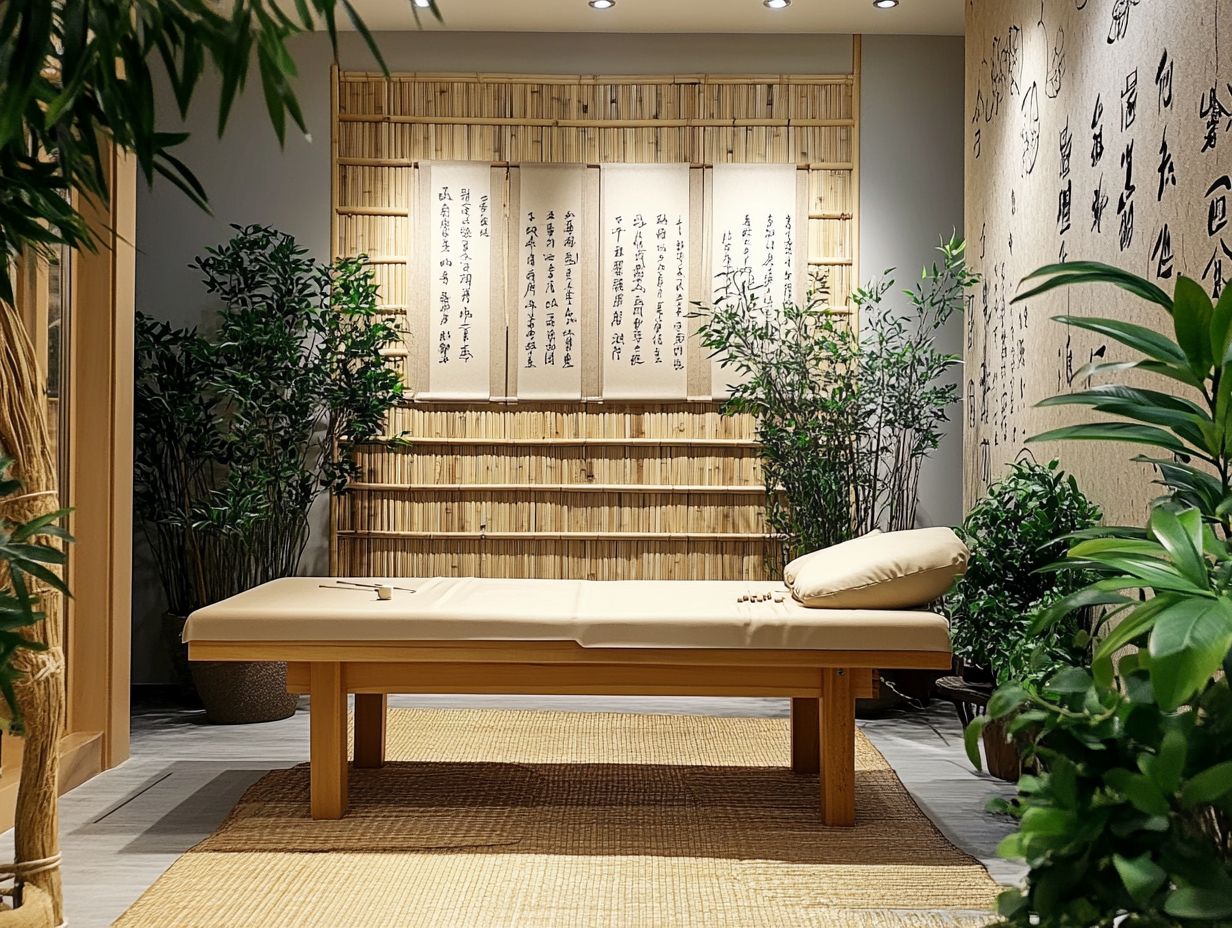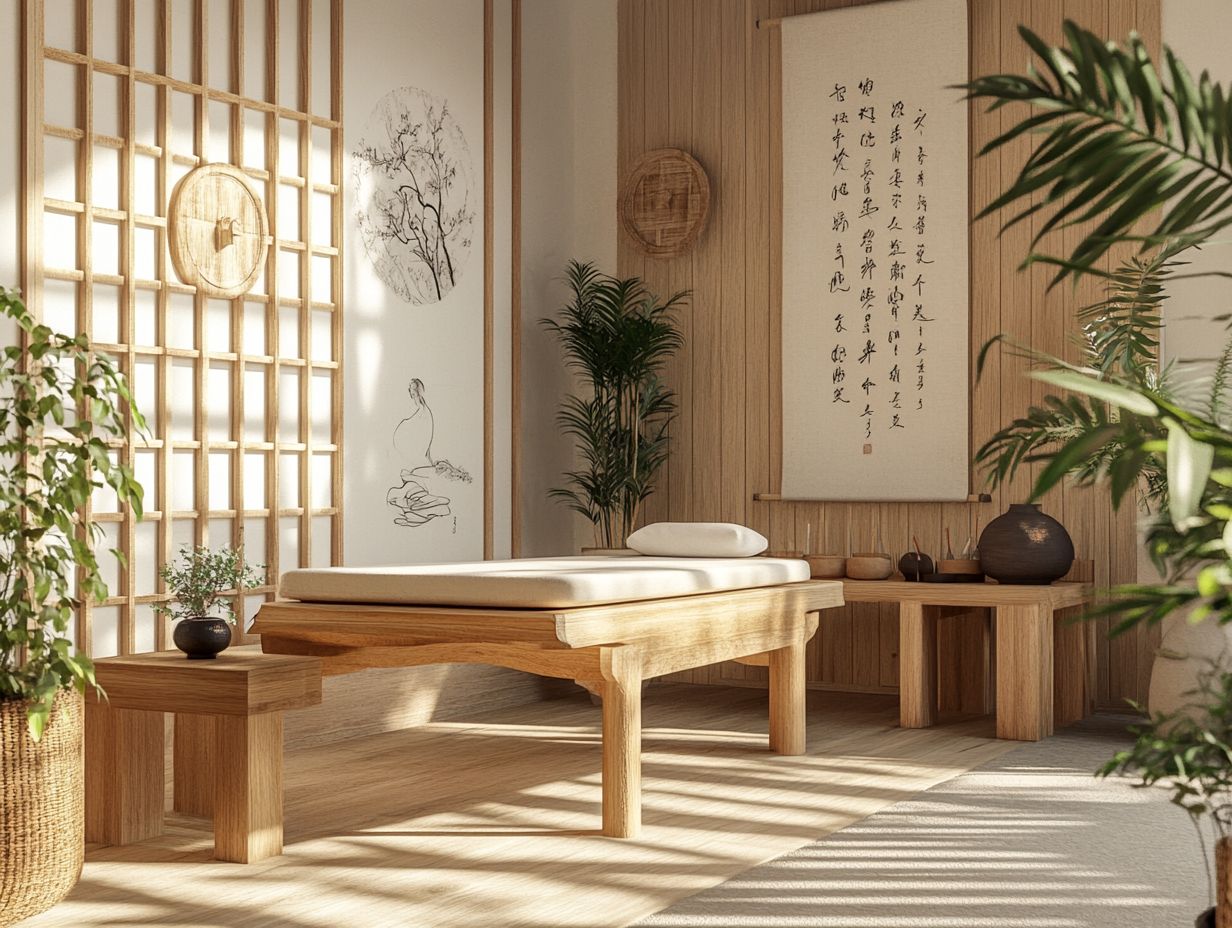Understanding the Philosophy Behind Acupuncture
Acupuncture, an ancient practice steeped in Traditional Chinese Medicine, presents a distinctive approach to health and wellness.
In this exploration, you ll delve into the philosophy that underpins acupuncture, highlighting essential concepts such as Qi, the energy that flows through your body, and meridians that serve as the foundation of this healing art.
Uncover the myriad benefits it offers, the diverse conditions it can address, and what to expect during an acupuncture session.
Whether you re intrigued by its principles or contemplating it for your own well-being, this guide will shed light on the fascinating world of acupuncture.
Contents
Key Takeaways:

- The philosophy behind acupuncture focuses on balancing the flow of energy, or Qi, through the body’s meridians.
- It works by stimulating specific points on the meridians, improving energy flow and overall health.
- Common ailments, such as pain, anxiety, and nausea, can be effectively treated with acupuncture.
- This makes acupuncture a beneficial form of alternative medicine.
What is Acupuncture?
Acupuncture, a cornerstone of traditional Chinese medicine, is a holistic therapy that involves delicately inserting thin needles into specific points on your body. This practice harmonizes the flow of Qi, promoting pain relief and enhancing your overall health.
It s not just about physical relief; acupuncture also addresses mental health conditions, demonstrating its versatility in fostering wellness and healing.
With roots extending over 2,500 years, acupuncture has transformed from a spiritual ritual into a widely recognized alternative therapy embraced worldwide. Researchers are investigating its underlying mechanisms as it gains significant attention for effectively managing chronic pain.
Its growing integration into modern healthcare reflects an increasing appreciation for holistic approaches to wellness, allowing you to explore treatment options that prioritize the intricate connection between mind and body.
The Philosophy Behind Acupuncture
The philosophy of acupuncture is deeply rooted in traditional Chinese medicine, emphasizing the significance of Qi the vital life force that flows through meridians in your body.
This ancient system posits that true health arises from the harmonious interplay of Yin and Yang. When these energies become disrupted, it can lead to various ailments, from chronic pain to mental health disorders.
Traditional Chinese Medicine Principles
Traditional Chinese medicine (TCM) offers a holistic approach to health, emphasizing the vital interconnection between your body, mind, and environment, essential elements for achieving optimal well-being.
At the core of this ancient practice is the principle of balance and harmony. True health is a state of equilibrium among your various bodily systems.
TCM practitioners draw from a rich array of treatments, including acupuncture, herbal medicine, and dietary therapy, customizing methods to suit your unique needs.
By focusing on the root causes of imbalances rather than simply alleviating symptoms, you can access treatment options that provide profound benefits.
This comprehensive approach not only aims to restore your physical health but also nurtures your emotional and spiritual well-being, fostering a deeper connection to your own body and the world around you.
How Acupuncture Works
Acupuncture works by stimulating specific points on your body, effectively releasing Qi and promoting a harmonious flow of energy.
When needles are delicately inserted at these strategic locations, they are thought to alleviate pain, enhance blood circulation, and elevate overall health through various physiological mechanisms.
Scientific evidence increasingly supports this practice, affirming its potential benefits for your well-being.
Discover how acupuncture can transform your health today!
Understanding the Concept of Qi

Qi is often translated as ‘life force’ or ‘energy.’ It is a cornerstone of traditional Chinese medicine, representing the vital energy flowing through your body and influencing both your physical and mental health.
Maintaining a balanced flow of Qi is crucial for your well-being. Any disruption can lead to various health issues. When this energy becomes blocked or imbalanced, you might experience chronic pain, increased stress levels, or even mental health challenges like anxiety and depression.
Acupuncture plays a key role in restoring this balance by stimulating specific points in your body, allowing Qi to circulate freely. This whole-body method not only alleviates physical discomfort but also promotes emotional stability and resilience, illustrating the profound interconnectedness of your body and mind.
Ultimately, embracing the principles of Qi can significantly enhance your overall health and elevate your quality of life.
The Role of Meridians
Meridians are pathways through which Qi flows in your body, connecting various acupuncture points that correspond to different organs and bodily functions. They play a crucial role in maintaining your health and wellness.
These pathways facilitate the movement of energy and reflect the intricate wisdom of traditional Chinese medicine, showing how your body’s systems are interlinked. By stimulating specific acupuncture points along these meridians, practitioners can correct imbalances that disrupt the flow of Qi, which is essential for your optimal health.
Each meridian is associated with particular organs, such as your liver or kidneys. Understanding these connections enables targeted treatments that enhance your bodily functions.
When you achieve balance within these meridians, you may experience improved vitality, reduced stress, and better overall health, embodying the holistic approach that defines traditional Chinese practices.
Benefits of Acupuncture
The benefits of acupuncture go far beyond simple pain relief. You’ll discover a wealth of health advantages, from alleviating chronic pain to providing much-needed stress relief and enhancing your mental well-being.
This makes acupuncture a truly valuable alternative therapy you should consider.
Improving Energy Flow and Overall Health
Acupuncture enhances your energy flow by restoring balance, promoting overall health, and fortifying your immune system essential for preventing illness and aiding recovery.
This ancient practice works by stimulating specific points along your body’s meridians, facilitating the movement of vital energy known as Qi. In doing so, it not only alleviates pain but also boosts blood circulation, ensuring nutrients and oxygen are effectively delivered throughout your body.
With improved blood flow, you might experience faster healing times and greater resilience against infections. You’ll be amazed at how acupuncture can help you manage stress, significantly contributing to your overall wellness.
Many individuals notice fewer instances of illness and a remarkable boost in energy levels following regular sessions.
Conditions Treated by Acupuncture
Acupuncture presents itself as a highly effective treatment option for a diverse array of conditions, such as chronic pain and various mental health issues.
This underscores its remarkable versatility within the realm of holistic health practices.
Common Ailments and Symptoms

Common ailments and symptoms that acupuncture can treat include chronic pain, migraines, and various mental health issues, showcasing its effectiveness as a complementary therapy in today s healthcare landscape.
Along with these, acupuncture offers relief from stress-related disorders such as anxiety and depression, helping you regain emotional balance. It can also address hormonal imbalances, making it a supportive option for those facing challenges like infertility or menopause.
Many individuals report improved sleep quality and an enhanced sense of well-being after their treatments. By stimulating specific points in the body, this ancient practice promotes energy flow, aiding in physical recovery and boosting your overall vitality.
Ready to explore how acupuncture can transform your health? Book a session today!
What to Expect During an Acupuncture Session
During your acupuncture session, you can expect a thorough evaluation that sets the stage for your treatment.
After this assessment, fine needles will be gently inserted into specific acupuncture points. These points are tailored to promote relaxation, relieve discomfort, and enhance your overall well-being.
How Acupuncture Works
The acupuncture process includes various techniques:
- Manual Stimulation: This is often your go-to method for relaxation and pain relief.
- Electro-Acupuncture: This technique employs electrical currents to enhance stimulation and is particularly effective for muscle pain or neurological conditions.
- Moxibustion: This involves warming specific points on the body by burning mugwort, which invigorates the flow of qi and is beneficial for digestive issues.
You may experience a little soreness or bruising after your session, but don t worry these effects are usually very mild compared to the potential drawbacks of traditional pharmaceuticals, which can lead to dependency and adverse reactions.
Many people find that acupuncture is a holistic alternative or a complement to conventional treatments, promoting overall well-being without the extensive risks tied to more invasive medical procedures.
Frequently Asked Questions
What is the philosophy behind acupuncture?
The philosophy behind acupuncture is rooted in ancient Chinese medicine. It is based on the concept of qi (pronounced “chee”), or vital energy, flowing through the body along pathways called meridians. When this energy becomes blocked or imbalanced, it can lead to illness and pain. Acupuncture aims to restore balance and promote healing by inserting thin needles into specific points along the meridians.
How does acupuncture work?

According to traditional Chinese medicine, acupuncture works by stimulating specific points along the meridians to remove blockages and restore the flow of qi. In Western medicine, it is believed that acupuncture may help to stimulate the central nervous system, release natural pain-relieving chemicals, and promote blood flow to the affected area.
Are there different types of acupuncture?
Yes, there are different types of acupuncture, including traditional Chinese acupuncture, Japanese acupuncture, and Korean acupuncture. Each type may use slightly different techniques and philosophies behind its practice.
What are the benefits of acupuncture?
Some potential benefits of acupuncture include:
- Pain relief
- Stress reduction
- Improved mood
- Enhanced overall well-being
Acupuncture may also be used to treat various health conditions, such as headaches, digestive issues, and chronic pain.
Is acupuncture safe?
When performed by a trained and licensed practitioner, acupuncture is generally considered safe. The needles used are sterile and disposable, which reduces the risk of infection. However, like any medical treatment, there are potential risks and side effects, such as bruising, bleeding, or infection.
How many acupuncture sessions are needed for optimal results?
The number of acupuncture sessions needed can vary based on the individual and the condition being treated. Some may experience relief after just a few sessions, while others may require regular ongoing treatments. It s best to discuss your specific needs and goals with a qualified acupuncturist.
Start your journey to wellness today! Book a session or consult an acupuncturist for more personalized advice.






